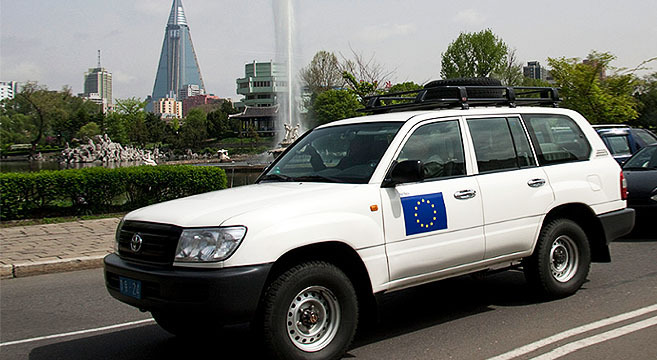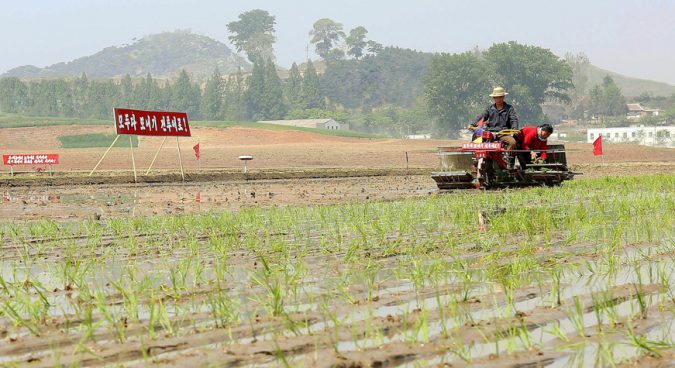Italy granted UN sanctions exemption to fund Food Security Office in Pyongyang | NK News - North Korea News
July 31, 2019
Login

Italy granted UN sanctions exemption to fund Food Security Office in Pyongyang
Over 1 million euros to be transferred for Italian firm’s technical support
Colin Zwirko
July 30th, 2019
FacebookTwitterEmailLinkedInGoogle+Print
Share42
The UN Security Council (UNSC) committee in charge of sanctions on North Korea has granted a humanitarian exemption allowing the transfer of funds into the DPRK for an Italian company’s work in food-related matters.
The funds will be used for international and local staff as well as operating costs inside the country at the European Commission (EC)-funded Food Security Office (FSO) in Pyongyang, for work by the firm Agriconsulting Europe SA (AESA).
Documents included with the latest exemption — which appeared online on Monday — state that Brussels and Rome-based AESA has received a tender or grant from the EU to “[provide] technical support for food-related matters to the DPRK,” operating out of the FSO.
The exemption is notable: it is the first listed under the “Humanitarian Exemption Requests” page of the UN 1718 Sanctions Committee site this year which exempts the transfer of money instead of goods or items to be used in aid projects.
The letter, dated July 1 and addressed to Italy’s Permanent Representative to the UN Maria Angela Zappia, states that “no goods or materials are to be transferred to the DPRK” under the exemption.
Italy appears to have made the initial request, said to have been dated June 3, on behalf of the FSO and AESA’s Rome office.
Beyond stating AESA will provide “technical support for food-related matters,” precise details of projects in North Korea now possible with the new access to funds were not included in the exemption documents.
Agriconsulting’s Italian website states that the organization offers services in farm management, public administration and development programs, land and environmental monitoring, information systems management, and sustainable development, among other areas.
Details of the funds, however, were provided, with the amount to be transferred into North Korea for local use totaling 1,060,000 euros for the period of March 2019 to February 2022, according to the letter’s annex.
The money will cover staff salaries and fees for locals, international employees’ out of pocket expenses and apartment rental fees to be paid to the North’s General Services Bureau (GSB), and other costs to various local providers.
It includes 192,000 euros to be paid to seven local support staff members over the three-year period until 2022, each receiving around 9100 euros per year.
The document uploaded by the UN also shows that over 200,000 euros will go towards living costs of the international team members and support staff.
These consist of a “key expert” team leader and member to both stay for most of the duration, as well as “AESA backstopping and support staff” with shorter stays.

North Korean state media and international organizations have been sounding the alarm in recent months over possible drought and efforts to boost agricultural production and food security | Photo: KCNA
In addition, 314,000 euros are allocated for operating a fleet of four vehicles in the country, with costs expected to be paid to the Korean General Insurance Company and “fuel stations and local dealers for spare parts.”
Another 50,000 euros will be used to purchase two new second-hand vehicles in the DPRK, according to the annex.
Costs listed are explicitly for expenses while in the DPRK, with the document stating that the total value of the AESA contract awarded by the EU is 2.4 million euros.
It is unclear how the funds will be transferred, as there is currently no operational banking channel due to sanctions, following the breakdown of a channel previously exempted which allowed a Russian bank in principle to move funds from a German bank on to Pyongyang.
In lieu of electronic transfers, large cash bundles would have to be carried by organization representatives into the country – a method which has attracted harsh criticism of sanctions from aid workers in the past for being dangerous and causing a range of issues.
NK News has reached out to both the FSO in Pyongyang and AESA offices in Europe for further details of the logistics of the project.
The humanitarian exemption is the first from the UN committee in over a month, and follows almost two-dozen exemptions this year after major criticisms that sanctions were hampering aid work.
But despite the flurry of exemptions, NK News understands that aid organizations remain frustrated with administrative burdens caused by the lengthy exemption process and the looming possibility of U.S. secondary sanctions.
In an example specifically related to funding issues due to the lack of a banking channel, Finnish NGO Fida International pulled out of operations in the DPRK last month, stating that continued U.S. sanctions pressures “make the financial services related to North Korean projects impossible.”
Edited by James Fretwell
Featured image: Eric Lafforgue
No comments:
Post a Comment